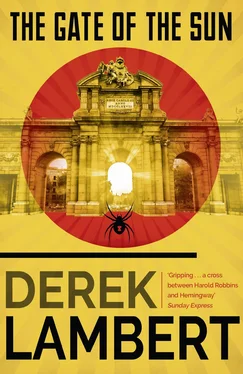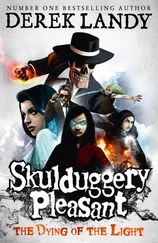In front of the beans lay the broken propeller of an aeroplane. He tried to touch it but his arm was cold and heavy. He flexed his fingers; they moved well enough but there was blood between them. He lay still concentrating, then blinked slowly and deliberately. Part of the fuselage was above him, radial engine bared. So he had been flung out of the cockpit. He tested his other arm. It moved freely. So did his legs, but his chest hurt and the pain was worse when he breathed deeply.
He sat up. Easy. Except that his right arm didn’t belong to him. He could pick it up with his left hand as though it were a piece of baggage. Blood dripped from his fingers. He looked for the wound and found it near the elbow. His thumb felt bone.
He stood up and, supporting himself against the walls, made an inspection of the farmhouse. It was a poor place with thin dividing walls painted with blue wash. Sagging beds were covered with straw palliasses, a jug of sour-smelling wine stood on a cane table.
The strength left his legs and he sat on a crippled chair. Where was he? Behind Fascist lines, behind the Republicans, in no-man’s-land? He heard gunfire and the venomous explosions of fragmentation hand-grenades; but he couldn’t tell how far away they were.
What he needed was a drink and a bandage to stop the blood seeping from the hole in his arm. He went to the kitchen and opened a cupboard painted with crusted varnish and found a half-full bottle of Magno brandy. He poured some down his throat. It burned like acid but the power returned to his legs. He ripped down a chequered curtain and tore off a strip; he eased his wounded arm from his flying jacket and bound the wound, knotting the cloth with his teeth and the fingers of his good hand.
He looked out of the window. The ground mist had returned, so it was late afternoon. Gunfire flashed in the mist.
Despite his wound he was hungry. He returned to the store-room and chewed a couple of locust pods; they made him feel sick.
He patted the fuselage of the Polikarpov. It was still warm.
He sat down and tried to visualize the battlefield as he had seen it from the air. The hills that glittered in the sun to the west, empty cornfields, vineyards, then the canal and the river and the Pindoque bridge which carried trains loaded with sugar from La Poupa factory to the railway to Andalucia. On the opposite side of the river the heights of Pingarrón where the Republicans were entrenched. But he still could not envisage where he was.
When evening had pinned the first star in the sky he opened the door and made his way towards the voice of the river.
The rabbit, one ear folded, stared at them from its hutch in the yard. It was a big problem, this rabbit. It was a pet and it was dinner. No, more – dinner, lunch and soup for supper the next day.
The rabbit, grey and soft, twitched its whiskers at Ana and the children.
‘I think he’s hungry,’ said Pablo, thereby encapsulating the rabbit’s two main faults – it was masculine and it was always hungry. What was the point in keeping a buck rabbit which could not give birth to other rabbits? What was the point of wasting food on an animal which was itself sustenance? Was there really any sense, Ana asked herself, in wasting cabbage stalks and potato peelings on a rabbit when her children were threatened by scabies and rickets?
But despite its appetite, despite its masculinity, this rabbit possessed two trump cards: it was part of the family, thumping its hind legs when the air-raid siren wailed and flattening its ears when bombs exploded, and it was available for stud to the owners of doe rabbits who would exchange a sliver of soap or a cupful of split peas for his services.
Ana regarded the rabbit with exasperation. Jesús would have known what to do.
But Jesús was at Jarama fighting the Fascists. Fighting and writing poetry – two of his front-line poems had been published in Mundo Obrero and one of them, a soldier’s thoughts about his family, hung framed on the wall among the formidable ancestors.
What would Jesús have done about the rabbit? Killed it? Ana doubted that: he would have departed, and returned, a curved smile of triumph on his face, with provisions mysteriously acquired. Like a magician, he never disclosed the secrets of his bartering but Ana suspected that he exchanged poems for provender – there were still wells of compassion beneath the brutalized streets of Madrid.
He had returned once, at Three Kings, with a doll for Rosana that he had carved with his pocket-knife in the trenches, and shining cartridge cases and studded fragments of a Mills bomb for Pablo’s war museum. But he had changed since Ana had sent him to war: he was still good with the children but with her, although gentle, he was wary and when they lay together in their sighing bed he seemed to be searching for the girl he had met and not the woman she now was. They hadn’t made love until they were married and they didn’t make love now; instead she held him until he slept and stroked his forehead when he whimpered in dreams of battle.
He was in the Popular Army, formed to bring order to the militias and Irresponsibles, but as he walked away from the chabola , stooping under the weight of the carnage he had witnessed, he didn’t look the least bit like a soldier. I am the warrior, Ana thought, regarding the rabbit speculatively, and he should be the provider.
Food! She turned away from the rabbit, allowing it one more reprieve, and went into the bedroom to fetch her shawl and her shabby coat and her shoes laced with string darkened with blacking. She hated the hunger that was always with her, because it was a weakness that distracted her from the Cause.
She left Pablo fashioning a whistle out of a cartridge case and Rosana painting a water colour of a harlequin in black, red and yellow, arm raised in a clench-fist salute.
As she crossed the yard the rabbit thumped its legs.
She went first to an old woman who lived on her own in a hovel that stood alone, like an ancient’s tooth, in a street of rubble. Here she made wreaths with paper flowers tied with black and red ribbon; the flowers were always red and she was always busy. Sometimes she possessed extra food with which the bereaved had paid for their wreaths, but there was none on view today.
‘Just a little bread,’ Ana pleaded, hating herself. ‘It doesn’t matter if it’s stale; I can toast it.’ At least they had fires in the chabola , kindled with slats from the ceilings of collapsed houses and fuelled with furniture – a walnut writing-desk had burned for two days.
‘What have you got to offer?’ the crone asked. In her youth she had married a member of the CNT; when he had died she had become the mistress of a doyen of the UGT; now she believed that age was an amnesty for the past. Her face was blotched and hooked; in her youth it must have been sharp enough to cut down trees, Ana thought.
‘A poem?’
‘Ah, a poem. What a beautiful thought, Ana Gomez.’ Beneath her arthritic fingers scarlet crêpe blossomed. ‘Except that I cannot read.’
‘If I read it you will remember it.’
‘I would prefer jewellery,’ the crone said.
‘I have no jewellery, only my wedding ring.’
‘I have a little bread,’ the crone said. ‘A little rice. Admittedly with weevils but beggars can’t be choosers, can they, Ana Gomez?’
Ana twisted the gold band on her finger; she remembered Jesus placing it there.
‘I have money,’ she said.
‘Who wants money? There is nothing to buy with it.’
‘I will come back,’ Ana said. With a gun! ‘Tell me, do you make wreaths for Fascists?’
The crone gazed at her suspiciously. ‘I make wreaths for the dead,’ she said.
Perhaps one day she will make a wreath for Antonio, Ana thought as she stepped over a fallen acacia on a street scattered with broken glass. He had returned to the capital once, as furtive as a pervert, wearing a beret and filthy corduroy trousers and a pistol in his belt. He had crossed the front line, relatively quiet on the western limits of the city since the fury of November, leaving his blue Falange shirt behind him.
Читать дальше












